
The Socialist Party of Timor is a Marxist–Leninist political party in East Timor.
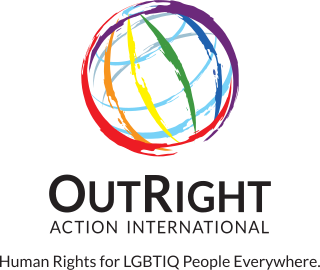
OutRight International (OutRight) is an LGBTIQ human rights non-governmental organization that addresses human rights violations and abuses against lesbian, gay, bisexual, transgender and intersex people. OutRight International documents human rights discrimination and abuses based on their sexual orientation, gender identity, gender expression and sex characteristics in partnership with activists, advocates, media, NGOs and allies on a local, regional, national and international level. OutRight International holds consultative status with ECOSOC.
Graduate Women International (GWI), originally named the International Federation of University Women (IFUW), is an international organisation for women university graduates. IFUW was founded in 1919 following the First World War by both British and North American college and university workers who were hoping to contribute to congenial relations between women of different nationalities. Over 100 years later, GWI continues to advocate for women's rights, equality and empowerment through the access to quality secondary and tertiary education as well as training up to the highest levels. The goal is for 100% of girls and women worldwide to achieve an education beyond primary school.

Zacarias Albano da Costa is an East Timorese politician and diplomat. On 8 August 2007, he became Minister of Foreign Affairs following the 2007 parliamentary election. Before being appointed as Minister for Foreign Affairs of the Democratic Republic of Timor-Leste, Minister da Costa was a Member of Parliament and Leader of the Social Democratic Party (PSD) Bench at the Parliament. In addition to his ministerial role, he is currently Chairman of the National Council of the PSD.
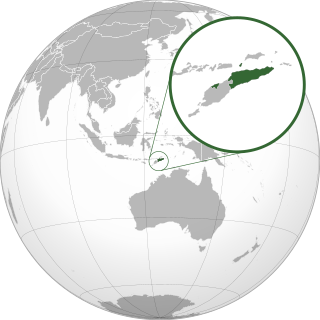
Lesbian, gay, bisexual, and transgender (LGBT) people in East Timor face legal challenges not experienced by non-LGBTQ residents. Both male and female same-sex sexual activity are legal in East Timor, but same-sex couples and households headed by same-sex couples are not eligible for the same legal protections available to opposite-sex married couples.
The United Nations Entity for Gender Equality and the Empowerment of Women, also known as UN Women, is a United Nations entity charged with working for gender equality and the empowerment of women. UN Women is charged with advocating for the rights of women and girls, and focusing on a number of issues, including violence against women and violence against LGBT people.

The Asian Forum for Human Rights and Development (FORUM-ASIA) [previously known as Forum-Asia] is a membership-based regional human rights organisation with 85 member organisations in 23 countries across Asia. It is committed to the promotion and protection of all human rights including the right to development.
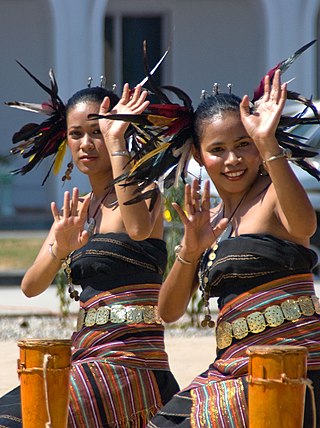
The East Timorese people mixed racially with Melanesian and Malay genetically. Most of the East Timorese population are Roman Catholic.

The Asian Forum of Parliamentarians on Population and Development (AFPPD) is a regional non-governmental organization (NGO) that serves as a coordinating body of 30 National Committees of Parliamentarians on Population and Development in Asia-Pacific. The objective of the organization is to strengthen the regional network of parliamentarians who are committed to implementing the population and development agenda, particularly the Programme of Action of the International Conference on Population and Development and the Sustainable Development Goals (SDGs). AFPPD aims to achieve this through capacity building for parliamentarians and National Committees.

East Timor is a multiparty parliamentary republic with a population of approximately 1.1 million, sharing the island of Timor with Indonesia's East Nusa Tenggara province. During the 24 years of Indonesian occupation and after the 1999 independence referendum, pro Indonesian militias committed many human rights violations. The country gained independence in 2002, and free and fair elections were held in 2007. The United Nations Integrated Mission in East Timor (UNMIT) and the International Stabilization Force remain in the country while it develops its own security forces, the National Police (PNTL) and Defence Forces (F-FDTL).
Aisling Swaine is a professor of Peace, Security and International Law at University College Dublin.
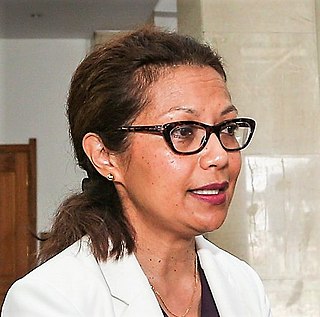
Milena Pires is an East Timorese politician and women's rights activist who served as director of the United Nations Development Fund for Women (UNIFEM) in East Timor. Since 2016, she has been the Permanent Representative of East Timor to the United Nations.
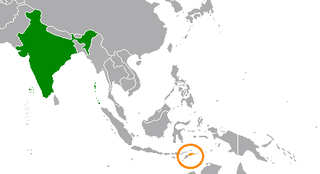
East Timor–India relations are the international relations that exist between East Timor and India. India maintains an embassy in Dili, while East Timor maintains an embassy in New Delhi. India previously announced on 7 September 2023 that it would open its embassy in Dili.

Mexican American Women's National Association, known today as MANA, A National Latina Organization, advocates for equality and empowers Latinas through leadership development. MANA was founded in 1974, making it one of the oldest active Mexican-American advocacy organizations, and as of 2000, it is considered the largest Latina organization in the United States. The organization was formed to address the intersection of Mexican-American and women's needs for equal rights. The founders created MANA with the intent of having a Latina-oriented organization. MANA publicizes and addresses Latina perspectives and needs through Social movements, Leadership education, and Advocacy within federal, state, and local governments. They have been involved with multiple major social movements throughout their history. These include advocating for the Equal Rights Amendment and Reproductive rights, as well as social movements on education, leadership development, women's healthcare, and racial discrimination in the work. MANA currently operates from its home base in Washington, D.C., and has local chapters across the nation.
Foreign aid for gender equality in Jordan includes programs funded by governments or non-governmental organizations (NGOs) that aim to empower women, close gender based gaps in opportunity and experience, and promote equal access to education, economic empowerment, and political representation in the Hashemite Kingdom of Jordan.
Women and Gender Equality Canada, known as Status of Women Canada from 1976 to 2018, is a department of the Government of Canada. Previously an agency under the Department of Canadian Heritage, it gained department status after a vote in December 2018 passed the Budget Implementation Act, 2018, No. 2, which included legislation in favour of evolving the agency into a department and increasing its power, duties, and functions to those concerning not just women, but all gender identities. The purpose of the department is to "advance equality with respect to sex, sexual orientation, and gender identity or expression through the inclusion of people of all genders, including women, in Canada's economic, social, and political life" as well as the intersection of these with other identities such as ethnicity, age, socio-economic level, disability, and others. The department partners with other areas of government, both federal and provincial, as well as civil and private organizations in order to achieve this. It is currently headed by the Minister for Women and Gender Equality, Marci Ien.

Maria Domingas Fernandes Alves, nickname Mana (sister) Micato or Mikato, resistance name Beta Mau, is a women's rights activist, former resistance fighter, civil servant and non-party politician from East Timor. From 2007 to 2012 she was Minister of Social Solidarity.
Filomena Barros dos Reis is an East Timorese social justice activist and recipient of the N-Peace Award in 2011.
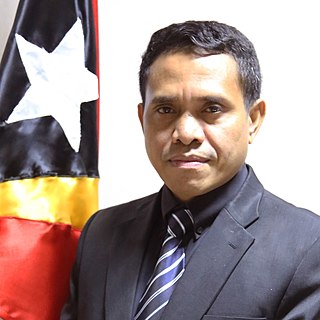
Miguel Pereira de Carvalho is an East Timorese politician and public administrator, and a member of the Fretilin political party.

Action for Development (ACFODE) is an indigenous (Ugandan) non government Women Association founded by women academicians; Dr Joy Kwesiga, Dr Hilda Tadria and Dr Ruth Mukama with the help of Maxine Ankra with the aim of incorporating ideas discussed during the United Nations World Conference on Women held in July 1985 in Nairobi, Kenya. Uganda had been denied entry into the conference because of the prevailing political climate at the time, thus the need to start an organization that would champion women issues without government interference.













